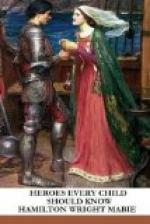Although Eurystheus was seized with tremor at the coming of Hercules with the Erymanthian boar, still he continued relentless, and demanded the performance of the next task, which was nothing less than the cleaning out in one day of stables where numerous cattle had been confined for many years. These noisome stalls belonged to Augeas, a King of Elis and a man rich in herds—so rich indeed that as the years passed and his cattle increased he could not find men enough to care for his kine and their house. Thus the animals had continued, and had so littered their abiding place that it had become well nigh intolerable and a source of disease and even of pestilence to the people.
When Hercules came to King Augeas he said nothing to him of the command Eurystheus had laid upon him, but looking through the stables which covered a space of many meadows he spoke of the cattle and the evil condition of their housing. “The moon-eyed kine will do better in clean stables,” said the wise Hercules, “and if thou wilt pledge me a tenth of thy herds I will clean out thy stalls in a day.” To this Augeas delightedly agreed and, speaking as they were in the presence of the young son of the King, Hercules called upon the prince to witness the pact.
Now Hercules in going about the great stables had noticed that at the upper end of their building flowed a swift river, and at the lower end was a second swift stream. When therefore Augeas had pledged himself to the work, Hercules, beginning early next day, took down the walls at the upper end of the stalls and the walls at the lower end. Then with his own mighty hands he dug channels and canals and led the waters of the upper swift-flowing river into the heavily littered floor of the stalls. And the waters rose and pushed the litter before them and made one channel into the lower river, and then another and another and so, working through the hours of the day, the upper river scoured the stables clean and carried the refuse to the lower river. And the lower river took the burden and carried it out to the salt sea, which is ever and always cleaning and purifying whatever comes to its waters. And when night fell there stood the hero Hercules looking at his work—the filthy stables of Augeas cleaned.
When next day Hercules asked for the tenth of the herds which the King had pledged, Augeas refused to stand by his agreement. He had learned that this labour of cleaning his stables had been imposed upon Hercules, and he claimed he should pay nothing for it; in fact, he denied he had promised anything, and offered to lay the matter before judges. The cause therefore was tried, and at the trial the young son of the King, who had witnessed the pact, testified to the truth of Hercules’ claim. This so enraged his father that in most high-handed manner he banished both his son and the hero from Elis without waiting for the judgment of the court. Hercules returned to Mycenae. But again the cowardly and contemptible Eurystheus refused to count this labour, saying Hercules had done it for hire.




